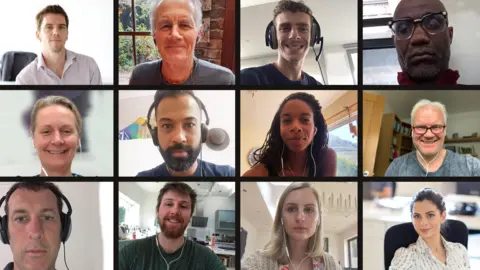 Jaime Teevan
Jaime TeevanWork conferences can typically be extremely highly effective.
Just like the one Jaime Teevan, chief scientist at Microsoft, says she had a couple of years in the past together with her chief government Satya Nadella, and Sam Altman the founding father of main AI agency OpenAI.
It had such a visceral influence on Ms Teevan that afterwards she sat in her automotive and screamed, elated at the potential of AI.
“I’ve by no means accomplished that earlier than, however there was simply an excessive amount of emotion,” she says.
The assembly was an indication of the potential of OpenAI’s now in style AI chatbot ChatGPT. And it left Ms Teevan satisfied that AI might be on the verge of remodeling many issues, together with conferences.
“Traditionally computing has been fairly good at serving to make the drudgery extra environment friendly,” she says. “However having one thing that may assist throw out a bunch of concepts, and be capable of mirror on these, that basically feels qualitatively totally different, and like an actual alternative.”
Nonetheless, whereas Ms Teevan will lengthy do not forget that particular work assembly, for many of us such gatherings with colleagues will be drudgery.
Elon Musk as soon as stated that “extreme conferences are the blight of massive corporations and nearly at all times worsen over time”. Few would disagree.
In the meantime, 72% of conferences are ineffective, according to one global study.
And your mind exercise drops when you may have a Zoom assembly, says a report by researchers at Yale College within the US, and the UK’s College Faculty London.
But because of the coronavirus pandemic, an awesome many companies and organisations have been pressured to maneuver their conferences on-line again in 2020, with everybody sitting in entrance of a webcam.
And like them or detest them, video conferences are right here to remain, by way of the likes of Zoom, Microsoft Groups, and Google Meet.
 Getty Photos
Getty PhotosMs Teevan says this swap was “fortuitous” as a result of it “created the chance for AI to [positively] influence our conferences”.
The three huge suppliers of video conferences expertise sure assume that is the case, and all now provide customers AI-powered assistants. Zoom has AI Companion, Groups has Copilot, and Meet has Duet AI.
Quickly increasing features already embody the AI transcribing the assembly for you, suggesting questions you may wish to ask, summarising the assembly in level kind, reminding you of who else is current, and even within the case of Meet – its AI attending an online meeting on your behalf.
Husayn Kassai is the founding father of London-based start-up Quench AI, which makes AI-powered coaching software program.
He predicts that sooner or later “everybody within the workforce can have some form of AI coach accompanying them” to conferences.
“Conferences are going to be much more productive, as a result of we might be going into them significantly better knowledgeable, and capable of make helpful and extra useful judgements,” says Mr Kassai.
He provides that employees will use AI “to assist get them clued up and provides them a breakdown of the knowledge”.
In consequence, he says conferences will begin to accomplish issues, in contrast to now, as a result of “folks aren’t speaking about stuff that issues as a result of they don’t seem to be ready”.
Mr Kassai additionally envisages AI performing as a form of moderator, providing suggestions after the assembly, even perhaps stating the issues the people within the room really feel unable to.
“When you may have an fool within the assembly room who goes off on a rant, and somebody who doesn’t say a lot… the AI may say issues like ‘speaker three, you solely spoke 2% of the time and subsequent time it’s essential to communicate 20% of the time’.”
 Husayn Kassai
Husayn KassaiMs Teevan claims that Copilot is already having “a reasonably important influence” on folks’s video conferences. “Individuals are capable of summarise conferences 4 instances quicker.”
But as quite a few stories over the previous yr have indicated, AI isn’t but foolproof, and may make errors, or as they’re additionally known as, “hallucinations”.
In response to the outdated adage “rubbish in, rubbish out”, Ms Teevan says Microsoft is at present doing a number of work to make sure that Copilot’s “AI prompting” is pretty much as good as potential.
AI prompting refers back to the AI giving the very best reply to the consumer’s query. To do that, it wants to have the ability to be taught as shortly as potential who the consumer is, what she or he does as a job, and which solutions they’re most certainly to need.
“Some of the widespread ways in which I take advantage of AI is to ask it what questions I ought to ask in a gathering,” says Ms Teevan.
To get the right solutions from the AI, Ms Teevan says it has to “perceive that I’m a analysis scientist and government at Microsoft”.
Enterprise psychologist Jess Baker says it’s straightforward to grasp why so many people don’t like work conferences. “The information suggests, as does our expertise, that the majority conferences are time consuming and ineffectual.”
She can also be “not satisfied that the overall stage of frustration will disappear altogether” because of AI. “I believe we might discover that we proceed to be annoyed with conferences, however for various causes – equivalent to, annoyance with particular person A who by no means exhibits as much as the Monday morning assembly, however as a substitute requests that the AI instrument attend on their behalf.
“Or frustration with the one that turns up late to each assembly, and makes use of the AI instrument to replace on what they’ve missed to this point. I can see how this might lead to elevated resentment and distrust between colleagues.”
But Microsoft’s Ms Teevan is satisfied that AI will assist to enhance conferences. “It may possibly assist folks really feel much less overwhelmed, it might probably assist them get began and test issues off their listing. And it might probably assist spark concepts, seeing issues in information methods and getting help there.”

